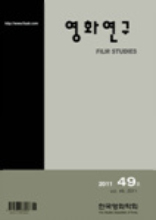- 영문명
- The Similarity of the Family Reductionism Shown in 'The Edge of Heaven' and 'Four Minutes': centered on the subject and the style
- 발행기관
- 한국영화학회
- 저자명
- 박재호
- 간행물 정보
- 『영화연구』제48호, 207~239쪽, 전체 33쪽
- 주제분류
- 예술체육 > 예술일반
- 파일형태
- 발행일자
- 2011.06.30

국문 초록
영문 초록
This paper is aimed to analyze the narratives developed from a family break-up and from family reductionism (homosexual family) and to study the similarity in directing of the two films, and . In three chapters are outlined the views of discipline and punishment of men, as the ruling class, against women, the subjugated class. In the first chapter, ‘Death, Family Break-up’, it is analyzed that the directing styles of the two films have conflicting codes. In , there is a design of conflict between a Turkish prostitute, Yeter, versus the Muslim fundamentalists in the beginning. After being threatened by two Muslim fundamentalists, Yeter accepts the offer of cohabitation by an old man, named Ali, because she is eager to escape the Muslim activists. However, in the end, Yeter is killed by Ali, who has delusional jealousy of her. The director describes the conflict of Yeter and Ali by showing their movements, from outside to inside, for quite a long time, and it gives an oppressive suspense to the audience. Also the director shows the inner conflicts of the son of Ali, named Nejat, who has a guilty conscience as pathos. In , there is also an old lady, Cruger, who suffers from a pathological guilty conscience, and a girl who displays defensive violence that came about from a psychological injury caused by an abusive male. Through the analysis of the psychology of the characters, it is found that there is a similarity between the indirect sense of guilt of Nejat and the direct guilty conscience of Cruger. In the second chapter, ‘The Desire of Having New Family’, study is made on the causal connection in the narrative between guns (symbol of violence and power), books (symbol of communication and peace), and the desire of having a new family in the perspective of mythos. Also a discussion is made about the Hegelian Law of unity and the conflict of opposites in . The study of in the second chapter is focused on the insert cuts of the fish bowl (symbol of sadist, male authority ideology), bugs, and Nazi documents (symbol of female masochist, subjugated class). These images are applied to three steps of La․can’s symbolic system. The symbolic (the world of communication), the imaginary(the world of mirror - step of Oedipus) and the real(the hole in communication). In the third chapter, ‘After conflicts (communication) anagnorisis, Family Reductionism’, we look into the repetitive shots and the reverse shots of the closed mental state of Iten, the main actress of . Also, analysis is made on Susan’s psychological fear in the moment of her encounter with Iten, who is the resembrance of Lotte, her daughter. More importantly, in this last chapter, a study is performed on the reinterpretation of the text of ‘Byram (the religious festival of Turkey)’, which references the restoration of new family in . In the conclusion, the similarity of the plot of these two films is discussed. The plot of is constructed differently from . It develops the sequences in the order of unstable communication, rising conflict (crisis), and enlightenment (tearing up documents). In the case of , the settlement comes after the efforts for communication by Nejat. In other words, the plot is composed in this order; ‘conflict(the development section)’, ‘the exertion of communication’ and ‘enlightenment (burnt offering)’.
목차
1. 서론
2. 본론
3. 결론
키워드
해당간행물 수록 논문
참고문헌
최근 이용한 논문
교보eBook 첫 방문을 환영 합니다!

신규가입 혜택 지급이 완료 되었습니다.
바로 사용 가능한 교보e캐시 1,000원 (유효기간 7일)
지금 바로 교보eBook의 다양한 콘텐츠를 이용해 보세요!



